Related Research Articles
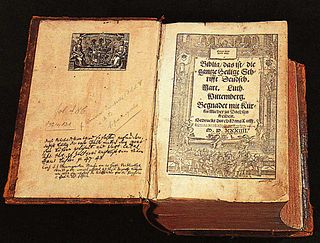
Year 1534 (MDXXXIV) was a common year starting on Thursday of the Julian calendar.
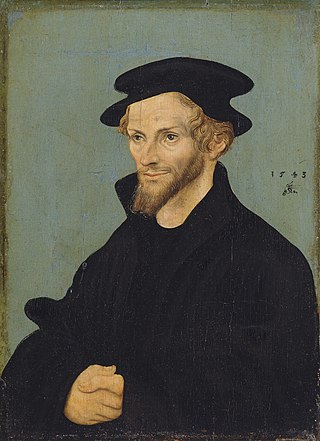
Philip Melanchthon was a German Lutheran reformer, collaborator with Martin Luther, the first systematic theologian of the Protestant Reformation, an intellectual leader of the Lutheran Reformation, and influential designer of educational systems.
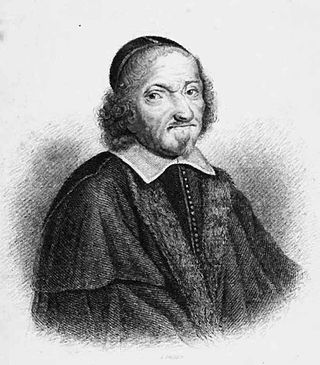
Myles Coverdale, first name also spelt Miles, was an English ecclesiastical reformer chiefly known as a Bible translator, preacher and, briefly, Bishop of Exeter (1551–1553). In 1535, Coverdale produced the first complete printed translation of the Bible into English. His theological development is a paradigm of the progress of the English Reformation from 1530 to 1552. By the time of his death, he had transitioned into an early Puritan, affiliated to Calvin, yet still advocating the teachings of Augustine.

Frederick II was King of Denmark and Norway and Duke of Schleswig and Holstein from 1559 until his death in 1588.

Christian III reigned as King of Denmark from 1534 and King of Norway from 1537 until his death in 1559. During his reign, Christian formed close ties between the church and the crown. He established Lutheranism as the state religion within his realms as part of the Protestant Reformation, and was the first King of Denmark-Norway.

John Rogers was an English clergyman, Bible translator and commentator. He guided the development of the Matthew Bible in vernacular English during the reign of Henry VIII and was the first English Protestant executed as a heretic under Mary I, who was determined to restore Roman Catholicism.

Nikolaj Frederik Severin Grundtvig, most often referred to as N. F. S. Grundtvig, was a Danish pastor, author, poet, philosopher, historian, teacher and politician. He was one of the most influential people in Danish history, as his philosophy gave rise to a new form of nationalism in the last half of the 19th century. It was steeped in the national literature and supported by deep spirituality.

Andreas Rudolph Bodenstein von Karlstadt, better known as Andreas Karlstadt, Andreas Carlstadt or Karolostadt, in Latin, Carolstadius, or simply as Andreas Bodenstein, was a German Protestant theologian, University of Wittenberg chancellor, a contemporary of Martin Luther and a reformer of the early Reformation.

Hans Tausen (Tavsen) nicknamed the “Danish Luther” was the leading Lutheran theologian of the Danish Reformation in Denmark. He served as Bishop of Ribe and published the first translation of the Pentateuch into Danish in 1535.

Hans Lassen Martensen was a Danish bishop and academic. He was a professor at the University of Copenhagen and Bishop of the Diocese of Zealand.

Peder Oxe was a Danish finance minister and Steward of the Realm.

Herluf Trolle was a Danish naval hero, Admiral of the Fleet and co-founder of Herlufsholm School, a private boarding school at Næstved on the island of Zealand in Denmark.

Niels Hemmingsen, Latinized Nicolaus Hemmingius, was a Danish Lutheran theologian. He was pastor of the Church of the Holy Ghost, Copenhagen and professor at the University of Copenhagen. The street Niels Hemmingsens Gade in Copenhagen is named in his honor.

During the Reformation, the territories ruled by the Danish-based House of Oldenburg converted from Catholicism to Lutheranism. After the break-up of the Kalmar Union in 1521/1523, these realms included the kingdoms of Denmark and Norway and the Duchies of Schleswig and Holstein, whereby Denmark also extended over today's Gotland and Øsel in Estonia.
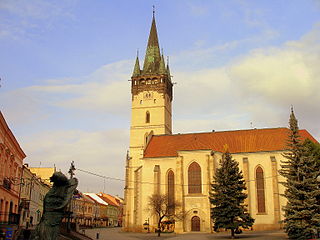
In 16th-century Christianity, Protestantism came to the forefront and marked a significant change in the Christian world.

Hieronymus Osius was a German Neo-Latin poet and academic about whom there are few biographical details. He was born about 1530 in Schlotheim and murdered in 1575 in Graz. After studying first at the university of Erfurt, he gained his master's degree from Wittenberg University in 1552 and later lectured on Poetics in the Philosophical faculty there. In 1558 he was crowned poet laureate in Copenhagen by King Christian III of Denmark. Thereafter he held teaching positions in Jena, Regensburg and Graz, identifying with Protestantism in the religious conflicts of the time. Osius was known as a pre-eminent poet whose works were frequently reprinted. They included his "Song on Christ’s Birth" ; an adaptation into Latin of the Homeric comic epic, the Batrachomyomachia ; an epic of the Dithmarschen Peasants’ War, which had only recently concluded and of which he also published a shorter version in German; and his collection of nearly 300 poems based on Aesop’s Fables.

Niels Kaas was a Danish politician who served as Chancellor of Denmark from 1573 until his death. He was influential in the negotiation of the Peace of Stettin and in the upbringing of Christian IV. Kaas also played an important role in the emancipation of Schleswig-Holstein.

Peder Palladius was a Danish theologian, Protestant reformer, and bishop of Zealand. As the first protestant bishop in Denmark, he oversaw the conversion of ecclesiastic affairs. He helped create the church ordinance which founded the Church of Denmark, produced a Danish translation of the Bible, and removed Catholic images and rituals from his diocese.
Peder Svave was a Pomerania-born Danish diplomat, privy councillor and rector of the University of Copenhagen. He owned Gjorslev Manor south of Copenhagen.
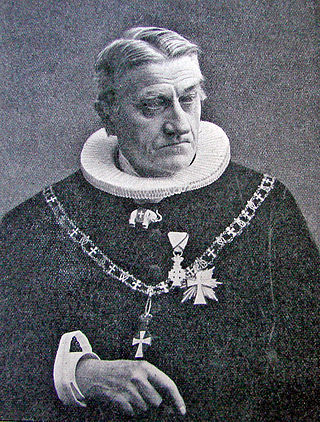
Thomas Skat Rørdam (1832–1909) was a Danish priest and theologian who was Bishop of the Diocese of Zealand from 1895 until his death. In the course of his ecclesiastical career, Rørdam served as a local priest in small parishes on Zealand, a parish priest at the Church of the Holy Ghost in Copenhagen, and as provost at Holmen Church before being instated as Bishop of Zealand. He was a decorated member of the Order of the Danneborg.
References
- 1 2 3 4 This article incorporates text from a publication now in the public domain : Pollard, Albert Frederick (1911). "Macalpine, John". In Chisholm, Hugh (ed.). Encyclopædia Britannica . Vol. 17 (11th ed.). Cambridge University Press. p. 191.